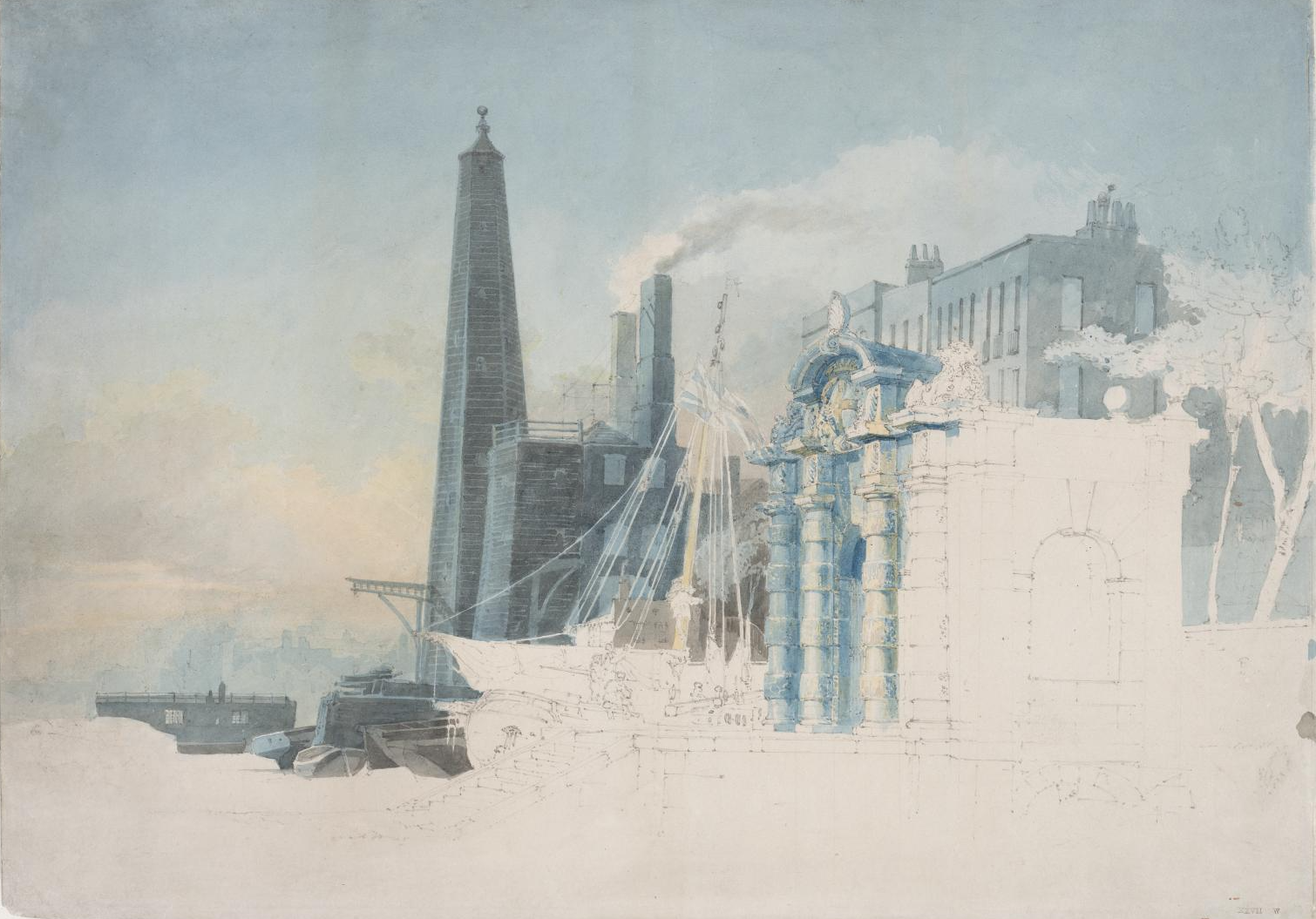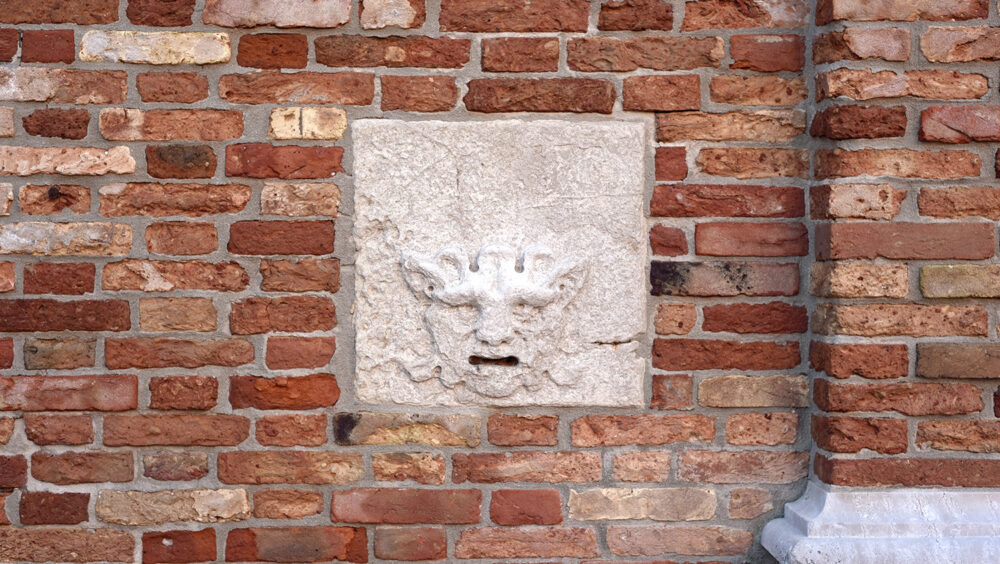
The great metropolis
The city of London appears as one of the marvels featured in Wonderful Things, an English 1852 publication collecting the “the most remarkable Wonders of the Ancient and Modern World”. Created by journalist and chartist Robert Kemp Philp, the piece is a curated text which combines the author’s reflections with extracts taken from Thomas De Quincey and American writer, William Ware. From the anonymity imposed on the individual by the city scale, to the perceived splendour of wealthy neighbourhoods, The Great Metropolis gives us a glimpse of how vividly the Victorian mind may have experienced the then-largest capital in the world. To launch this second part of our new section “Past Present Archive”, we have chosen another drawing by William Turner, showing the York House Water-Gate area next to the river Thames.
Of all the wonders of the world, we moderns are accustomed to regard London as the greatest. It has become our idea of the power, wealth and magnificence of a great nation. There is, however, perhaps, but one aspect in which this city can be regarded as preminently wonderful. Numerous cities of the past, which, as far as they are known to history, have been described in these pages – for many we have no records, save the silent ones of their desolate ruins – are, when considered simply as the habitations of men, certainly much more remarkable. In science, art, architectural splendour, and adaptation to wants and conveniences of their inhabitants, there are very many cities, both of the past and the present, which may proudly vie with our metropolis; but as a dense congregated mass of human life, London is unique in its immensity.
It is a whole nation crowded and huddled together in a mighty wilderness of streets; no idea can be formed of its magnitude in this respect, without witnessing the great tide of human beings which daily pours through its veins. Its two millions of population; its seven hundred million square feet of territory; it two hundred and sixty thousand houses, leave but a vague and very imperfect impression on the mind, when presented in the form of figures; but when we consider that it contains almost as many inhabitants as the whole of Scotland, that it would take four New Yorks, or sixty cities as large as Exeter, coequality extent and population, we can form some conception of the size of this mighty wilderness.
Within a circumference, says London as it is to-day, the radius of which does not exceed five miles, there are never fewer than two millions of human beings; and if the great bell of St. Paul’s were swung to the full pitch of its tocsin sound, more ears would hear it than could hear the loudest roar of Etna and Vesuvius. If we take our station in the ball or upper gallery of that great edifice, the wide horizon, crowded as it is with men and their dwellings, forms a panorama of industry and of life more astonishing than could be gazed upon from any other point in the universe.
London is equal, in extent, to any three or four other European capitals united, and superior to thirty of the largest towns in theUnited Kingdom, if brought together. It would require five hundred and thirty-four towns as large as Huntingdon to make another Metropolis; and it is computed that a population, equal to that of Salisbury, is added to London every three months.
Perhaps the finest description of the vastness of London, and the grandeur of the impression it leaves on the mind of the spectator, is that given by The English Opium-eater. “It was a most heavenly day in May of this year (1800),” says De Quincey, “when I first beheld and first entered this mighty wilderness. Often have I since then, at distances of two and three hundred miles or more from this colossal emporium of men, wealth, arts, and intellectual power, felt the sublime expression of her enormous magnitude in one simple form of ordinary occurrence, viz., in the vast droves of cattle — suppose on one of the great north roads — all with their heads directed to London, and expounding the size of the attracting body by the force of its attractive power, as measured by the never-ending succession of the droves, and the remoteness from the capital of the lines upon which they were moving.
A re-action so powerfully felt along radii so vast, and a consciousness, at the same time, that upon other radii still more vast, both by land and by sea, the same suction is operating night and day, summer and winter; and hurrying forever into one centre the infinite means needed for the infinite purposes, and the endless tributes to the skill or the luxury of her endless population, crowds the imagination with a pomp to which there is nothing corresponding on this planet, either among the things that are, except in ancient Rome.
We, upon this occasion, were in an open carriage; and chiefly (as I imagine) to avoid the dust, we approached London by rural lanes, and roads comparatively quiet and shady, collateral to the main ones, where any such could be found. In that mode of approach, we missed some features of the sublimity belonging to of the common approaches upon a main road; what I mean is, the whirl and uproar, the tumult and the agitation, which continually thicken and thicken throughout the last eight or ten miles before you reach the suburbs. Already at three stages’ distance upon some of the greatest roads, the dim presentiment of some vast capital reaches you obscurely and like a misgiving.
The blind sympathy with a mighty but unseen object in your neighbourhood, continues to increase, you know not how. Arrived at the last station for changing horses, Barnet suppose, on one of the north roads, or Houn slow on the western, you no longer think of naming the next stage; nobody says on pulling up, “Horses on to London” — that would sound ludicrous; one mighty idea broods over all minds, making it impossible to suppose any other destination.
Launched upon this final stage, you soon begin to feel yourself entering the stream as it were of a Norwegian maelstrom; and the stream at length becomes a rush. What is meant by the Latin word Trepidatis? Not anything peculiarly connected with panic; it belongs as much to the hurrying to and fro of a coming battle, a sofa coming flight: agitation is the nearest English word.
This trepidation increases both audibly and visibly at every half mile, pretty much as one may suppose the roar of Niagara and the vibration of the ground to grow upon the ear in the last ten miles of approach, with the wind in its favour, until at length it would absorb and extinguish all other sound whatsoever. Finally, for miles before you reach a suburb of London, such as Islington for instance, a last great sign and augury of the immensity which belongs to the coming Metropolis, forces itself upon the dullest observer, in the growing sense of his own utter insignificance. Everywhere else in England you yourself, horses, carriages, attendants (if you travel with any) are regarded with attention, perhaps even with curiosity: at all events, you are seen.
But after passing the final post-house on every avenue to London for the latter ten or twelve miles, you become aware that you are no longer noticed; nobody sees you; nobody regards you; you do not even regard yourself. In fact, how should you, at the moment of first ascertaining your own total importance in the sum of things — a poor shivering unit in the aggregate of human life?
Now, for the first time, whatever manner of man you were or seemed to beat starting — squire or ‘squireen’, lord or lord-ling and however related to that city, hamlet, or solitary house, from which yesterday or to-day you slipt your cable, beyond disguise you find yourself but one wave in a total Atlantic, one plant in a forest of America.”
To this passage of De Quincey’s, we may add another from the distinguished author of the Letters from Palmyra. He is deeply impressed by the same immeasurable vastness. “Magnitude,” he says, “is the distinguishing characteristic of London, as grandeur of natural position and scenery is that of Naples — beauty, that of Florence – moral interest, that of Rome – shops, plate-glass, splendour, that of Paris.
But in no other city does the peculiar characteristic of a place so force itself upon one’s notice as in London. There you are reminded of magnitude whichever way you turn. You become presently insensible of the beauty of Florence, to the shops of Paris, to the moral glory of Rome, but you never forget for one moment how big London is, how multitudinous its population.
When you find, after spending your first week, or more than that, in doing nothing else than scouring the capital from end to end, in order to catch some general notion of the place, that you are as much a stranger as when you began your travels – that though you have gone so far, you have made no progress, that though you have seen too much, you know and can remember nothing, that the city is still as new and unsoiled as ever – you receive a very lively and even painful impression of its enormous size.
“Everything else is subordinate to size. Churches are nothing. You pass St. Paul’s, and give it only a careless look. Columns and statues, Nelson’s and the Duke of York’s pillar, even Punch’s Duke, you overlook. Magnitude alone interests. This not only interests, it astonishes, absorbs, appals you; annihilates every other feeling. Queen, Lords or Commons, are nothing by the side of this immeasurable vastness. As a stranger, this is the first topic of conversation, and its interest never flags.
Yet it is not you, after all, who are so much interested by this size, as the Londoner himself, who is proud of it, and forces the subject upon you. His topics are not of art, pictures and statues, books, literature – they are not so much to his taste; but of London, its streets, squares, and parks; its extent, the masses always abroad, the crowds in the streets – the number of miles across it, the number of miles around it, its growth, even at present, like that of New Orleans or San Francisco; the countless omnibuses, the packing and tangling of carriages and other vehicles, fifty times a-day, where Farringdon Street crosses over to Blackfriar’s Bridge, and the admirable police for keeping all these masses in order. In the presence of London, it is just as it would be if you should meet a man fifty feet high, and of a weight proportionable.
You would be in a state of perpetual astonishment. You feel, moreover, as if your individuality were swallowed up, lost, in the enormous mass; as, in the system of the Pantheist, souls are in the divine substance”. The impression made upon the mind by this magnitude is only superior to that which immediately follows it — that of the wealth of the inhabitants. This comes upon you with hardly less distinctness, hardly less overwhelming force, than that made by size.
“In other capitals,” Ware goes on to say, “your admiration is directed to the palaces of some of the nobility, one here, and another there; sometimes to a street of palaces, as in Genoa. But in London you note these signs of wealth, not only here and there, but really everywhere – not only in this street and another, but in street after street beyond counting, and then in square afters square beyond counting. And in certain parts of the city, the population seems wholly composed of those who dwell in palaces. The rest of mankind have no place provided for them. And one begins to feel as if that were, there at least, the natural state of man, and as if he himself when he returns home, will find himself lodged in the same way; that you feel particularly in the purlieus of Eaton and Belgrave Squares, and anywhere, in short, at the West end”.
Recent articles

Southern California is many things. Quite infamously, it is known as a landscape defined by the automobile, from the emergence and diffusion of the highway system to fast food burgers, and the suburbanization of the United States. Walking this place then, would seem not only inconvenient, but ill advised. In… Read more »

What is today known as ‘whistleblowing’ could once take the form of interacting with a threatening gaze carved into the city wall. It is the case of the ‘boche de Leon’ or ‘lion’s mouths’ disseminated by the old Venetian Republic throughout its territory to suppress illegal activities. Through a close… Read more »

As he navigates through the recurrent lockdowns of the pandemic, stranded between hitchiking and muggings, job hunting and separations, Fabio Valerio Tibollo rediscovers photography as a powerful coping mechanism. Recording everything that happened around him for one year straight, from attending momentous events to finding curiosity in shots of simple living,… Read more »

